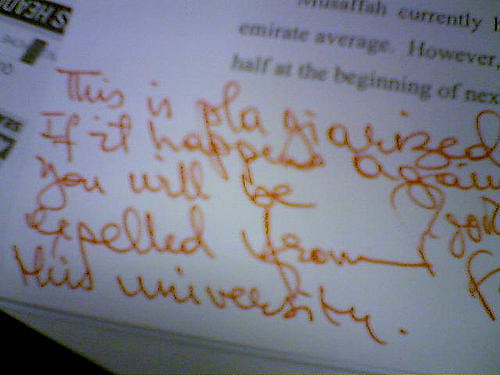Education
Plagiarism at Universities rises

THE FIRST weeks at University can be hectic.
There is finding friends, finding a decent takeaway, exploring the world in a number of ways that parents don’t like to acknowledge exist.
IGNORANCE NO EXCUSE
There are also, at most universities, a short bedding-in period when students are given an idea of the academic standards they are supposed to attain.
And one message is hammered home early and hammered home often: plagiarism can seriously mess up your academic future. If you are caught, you face a range of punishments which can include having to re-sit a course module up to expulsion from the University.
Even if you help someone cheat – because that is what plagiarism is, cheating – you can be penalised. The student who helps a friend cheat by letting them copy their submitted work is as guilty as the friend they try to ‘help’.
It’s not as if it’s a great mystery to students that the penalties for cheating are serious. That is spelled out by lecturers, and contained in every single course manual and the student code of conduct.
THE PRESSURE TO PERFORM
The pressure on students to perform can be tough. The increase in the numbers of students attending university has debased the value of a degree to the extent that some overseas universities no longer recognise UK universities’ award of one year Master’s degree, let alone regard undergraduate degrees as the hallmark of academic achievement. That applies to universities across the UK.
Most professions will specify that a 2:1 or better is required at undergraduate level for admission to postgraduate study. Graduate traineeships often specify the same requirement as a minimum.
Teaching, for example, is so desperately keen to recruit the best undergraduates and postgraduates that it offers incentives for those with better honours degrees in select subjects. The determination to shed the ‘those who can’t, teach’ label has created a marketplace in which a first class honours degree in a priority subject – physics, maths, chemistry, Welsh – can access £20K of funding for postgraduate qualification as a teacher. A 2:2 degree in any other subject gets you nothing in additional support.
CHEATING NOT NEW
A minority of students have always cheated, but the use of the internet has created an environment in which cheating has become easier. As higher education has become more accessible so has easy access to any number of shortcuts and back-alley ways to bumping up marks.
Looking at some standalone work-related training modules delivered by private companies, there is solid evidence that not only are the lecturers under-qualified to deliver the course material but that they turn a blind-eye to a culture of cut and paste.
The Herald is aware of one course tutor who actively encouraged one person attending such a course to simply resubmit their undergraduate coursework to gain the qualification they were seeking via the provider employing the tutor.
Self-plagiarism is still plagiarism and it is still cheating. More importantly, the training provider – or rather, the course tutor – was, of course, swindling the employer funding the training.
Does it matter?
Of course it does. In a working world in which employers look at qualifications first, how is the employer meant to distinguish between a qualification gained through GENUINE effort, work, and ability and one gained by a cheating recourse to Control-C followed by Control-V?
Those who get away with it are often smug, but they also liars and – ultimately – frauds.
BUYING FAILURE
Essay mills, the last resort of the truly idle cheat, claim to be able to deliver a guaranteed grade in any subject on any topic – for a price.
Essay mills represent cheating on a commercial and contractual scale. An essay mill is a business that allows customers to commission an original piece of writing on a particular topic so that they may commit academic fraud. Students commission others to write their coursework for them through an essay mill in the hope they will attain the grade required.
The Quality Assurance Agency for Higher Education said in 2016: “Providers of these services claim that the essays they produce are ‘100 per cent plagiarism free’, but that is a misleading claim. While the essay may not contain any plagiarised text itself, it becomes an act of plagiarism and academic dishonesty once the student submits it for assessment and represents it as his or her own work.
“If students submit work that is not their own, this compromises the fairness of the assessment process and poses a threat to the reputation of UK higher education. There are potentially serious ramifications for the public if people who falsely claim to be competent as a result of an academic award enter a profession and practise.”
In February this year, the UK Government began a consultation with QAA, universities, and the NUS. At that point, the UK Government suggested it was reluctant to go down the legislative route to try and tackle the problem, but in other countries both the provider AND the student would be guilty of a criminal offence.
Such is the scale of the issue across the UK, and not solely in Wales, that QAA has recommended that the advertising of ‘contract cheating’ services be banned and that criminal penalties be put in place for cheating by the use of essay mills. In New Zealand, essay mills have been fined and had their assets frozen.
PLAGIARISM IN WELSH UNIS
The issue has been thrown into sharp relief by a Freedom of Information Act request made by BBC Radio Wales.
Figures obtained by the broadcaster showed an increase in cases of alleged plagiarism from 1,370 2013/14 to 2,044 in 2015/16.
The BBC Freedom of Information request disclosed the following over the three academic years 2013/14 to 2015/16
- University of South Wales (approximately 30,000 students): 1,144 students accused of cheating, two prohibited from sitting future exams
- Cardiff Metropolitan University: 565 students accused of cheating, 12 prohibited from sitting future exams
- University of Wales Trinity Saint David – UWTSD: 928 students accused of cheating, 47 prohibited from sitting future exams
- Bangor University: 36 students accused of cheating, four prohibited from sitting future exams
- Cardiff University: 713 students accused of cheating, three prohibited from sitting future exams
- Swansea University: 1,157 students accused of cheating, 25 prohibited from sitting future exams
- Wrexham Glyndwr University: 103 students accused of cheating, three prohibited from sitting future exams
- Aberystwyth University: 551 students accused of cheating, 0 prohibited from sitting future exams
- The increased detection of plagiarism suggests that universities are becoming more adept at identifying incidents of academic fraud.
Many Universities use software to detect plagiarism, for example Turn-it-in. The software uses a document comparison algorithm that checks papers against a massive database of stored academic papers to identify cheats.
We asked UWTSD to comment on the figures.
Education
Pembrokeshire youth workers lead life-changing wellbeing visit to Iceland

A GROUP of Pembrokeshire school-based youth workers recently took young people from four secondary schools on an unforgettable six-day visit to Iceland — a journey focused not only on education, but also on wellbeing, confidence and personal growth.
Funded through Taith, an international learning exchange programme for people in Wales, the trip brought together young people from across the county, many of whom had never travelled abroad before.
From the moment they arrived, the experience was designed to encourage participants to step outside their comfort zones, build resilience and develop friendships in a supportive environment.
One of the most powerful moments came as the group stood together at the Old Harbour in Reykjavik under the night sky, watching the Northern Lights shimmer above them. For many, it provided a rare pause from everyday pressures — a moment of calm, connection and awe that youth workers say will remain with them for years to come.
The group also attended Iceland’s Festival of Lights, experiencing the atmosphere of creativity, music and community spirit. Sharing the celebration helped young people appreciate the importance of culture, belonging and collective joy in supporting mental wellbeing.
A visit to the Secret Lagoon offered further opportunities to slow down. Immersed in warm geothermal waters surrounded by dramatic scenery, participants experienced the benefits of relaxation and mindfulness. Youth workers noted that these quieter moments allowed conversations to develop naturally, strengthening trust and deepening relationships.
The trip placed strong emphasis on teamwork and independence. Young people navigated travel arrangements, managed responsibilities, supported one another and adapted to unfamiliar surroundings — experiences which helped build confidence and social skills.
Meeting Icelandic peers at a local youth club was another highlight. Conversations about daily life, hopes and ambitions reinforced the idea that young people across the world share similar challenges and aspirations. These exchanges fostered empathy, broadened horizons and encouraged a stronger sense of global citizenship.
Senior Youth Worker Tristy McDermott said the impact of the visit was clear.
“We observed noticeable growth in many participants over the six days — quieter young people finding their voice, friendships forming across schools, and individuals showing resilience in new situations,” she said.
“Time away from routine, combined with positive adult support and inspiring surroundings, created space for reflection and self-discovery.
“For the young people of Pembrokeshire, this was far more than a visit abroad. It was an opportunity to build confidence, strengthen wellbeing, form lasting memories and return home with a renewed sense of possibility.”
The group extended thanks to Taith for making the experience possible.
Community
Letterston nursery equipment could be stored in cemetery

A CALL for a storage container for a “well-established and valued” Pembrokeshire children’s nursery in a nearby cemetery has been submitted to county planners.
In an application to Pembrokeshire County Council, Diane Evans of Meithrinfa Do Re Mi Nursery seeks permission for the installation of a storage container, partially in retrospect, at Horeb Cemetery, Station Road, Letterston.
A supporting statement says: “The container is required to provide essential ancillary storage to support the lawful and established nursery use within the [nearby] chapel building.
“The site forms part of an active cemetery, owned and managed by a group of trustees. The applicant is one of the trustees and has obtained formal permission from the trustees for the container to be sited on this land. The area selected previously comprised a large, longstanding mound of garden waste which has now been removed. The land has been levelled and prepared with a hard-standing base.
“The container will be used solely for storage of nursery equipment and materials, including outdoor learning resources, maintenance equipment, and items required to manage both the nursery grounds and the cemetery land. No additional operational activity will take place within or around the container.”
It adds: “The day nursery provides childcare for approximately 83 children from the local community and employs 21 staff, all of whom live locally. The nursery is a well-established and valued community facility, supporting local families and contributing positively to the local economy. Adequate storage is essential to ensure the safe, efficient and compliant operation of the nursery. The chapel building itself has limited internal storage, making external ancillary storage necessary.”
It says the nursery “operates with a strong community focus and promotes sustainability and environmental awareness,” with plans to soften its appearance through the planting of trees, shrubs and flowers.
It added: “Children will take part in a ‘sow, grow and give’ project, growing cut flowers from seed. These flowers will be made available to the community, particularly visitors to the cemetery, who will be invited to cut flowers to place on the graves of loved ones. This initiative enhances biodiversity, strengthens community links, and adds social value to the cemetery space.”
The application will be considered by county planners at a later date.
Education
Parents urge council not to close Ysgol Llansteffan

Campaigners call for delay amid Welsh language investigation and rising pupil numbers
PARENTS and campaigners have urged Carmarthenshire County Council’s Cabinet not to recommend the closure of Ysgol Llansteffan when members meet on Monday (Feb 23).
The appeal comes ahead of a proposed decision that could see the village’s Welsh-medium primary school close in August this year.
The Ysgol Llansteffan Parents and Teachers Association (PTA), supported by Cymdeithas yr Iaith, has written to councillors calling for the process to be halted, arguing that key evidence remains incomplete and that the case for closure is flawed.

Among their concerns is an ongoing investigation by the Welsh Language Commissioner into the language impact assessment used to support the closure proposal. Campaigners say it would be inappropriate for the council to make a final decision before the investigation is concluded.
They also claim no council decision-makers have visited the school to verify the information used in the proposal, despite significant changes in circumstances, including a rise in pupil numbers to 17 as of January 2026.
The PTA argues that this increase undermines earlier projections and raises questions about the reliability of longer-term forecasts used to justify closure.
Financial concerns have also been raised. While council documents suggest annual savings of around £112,000, campaigners say transport costs of approximately £50,000 per year and inflationary pressures have not been clearly accounted for, potentially overstating the net benefit.
Parents say closure would remove parental choice and risk damaging Welsh-medium education in the area by forcing some children to travel further or potentially move into English-medium provision.
Cymdeithas yr Iaith has backed the PTA’s call, warning that the council’s objection report failed to properly address concerns that insufficient school capacity elsewhere could push pupils out of Welsh-medium education altogether.
Campaigners have also criticised what they describe as factual inconsistencies in the council’s reports, including outdated enrolment figures and conflicting capacity estimates for neighbouring schools.
The PTA has asked the council to defer any decision until updated data is available, the Commissioner’s findings are published, and alternative options for sustaining the school have been fully explored.
In their letter, parents stressed they remain willing to work constructively with the council to develop a long-term solution that would allow the school to remain open as a sustainable Welsh-medium provision for the community.
Carmarthenshire County Council has previously said the proposal is intended to address falling pupil numbers, high surplus places and financial pressures at the school. Cabinet members were told earlier in the process that neighbouring Ysgol Llangain would have sufficient capacity to accommodate pupils if the closure proceeds, and that transferring learners would provide access to improved facilities and help ensure long-term sustainability of education provision in the area.
The final decision is expected to be taken by full council in March following the Cabinet’s recommendation.
-

 Health5 days ago
Health5 days agoWithybush loses emergency surgery in shock health board decision
-

 Health5 days ago
Health5 days agoHealth board confirms major hospital changes across west Wales
-

 Health4 days ago
Health4 days agoConcerns grow over Bronglais stroke plans as politicians demand clarity
-

 Health5 days ago
Health5 days agoHealth board: Changes will bring “resilience and sustainability” to West Wales services
-

 Local Government2 days ago
Local Government2 days agoCandidate who withdrew from Hakin race will still appear on ballot paper
-

 Crime7 days ago
Crime7 days agoWoman, 79, made 141 unnecessary 999 calls putting lives at risk, court hears
-

 Business5 days ago
Business5 days agoMounting complaints: More Computer Solutions Wales customers claim losses
-

 Crime6 days ago
Crime6 days agoSexual assault allegation to be tried






























